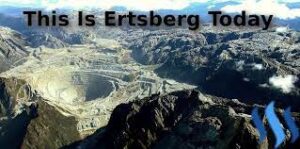Perhaps the strangest item in Ayn Rand’s review of the doomed passengers of the Taggert Comet as they approached their deaths in the Winston Tunnel, is also one of the shortest. It is her summary of the sins of the man in Bedroom H, Car No. 5. He was, it seems, “a businessman who had acquired his business, an ore mine, with the help of a government loan, under the Equalization of Opportunity Bill”. That is all she had to say about him.
On this matter we might have expected much more from her. She was, after all, in complete control of the narrative. She could have decided to emphasise that the mine acquired had been taken from someone else, from some ‘rational man’ who had brought it to high profitability and who had been robbed of it under the terms of the acquisitive legislation being passed by her imagined government of the chumocracy. The new owner might himself have been a chumocrat, and a fitting candidate for elimination, or he might have been another James Taggart, and incompetent as well. But none of this is suggested, and we must assume that this was done deliberately, and to make a point. To deserve death, it is enough to take a loan from government to start a business.
In view of Rand’s ignorance of the industry, it is surprising that mining should play a rather prominent role in ‘Atlas Shrugged’, but Francisco d’Anconia, who inherited the world’s largest copper mining empire, was a childhood friend of Dagny Taggart and a child prodigy who re-invented calculus at the age of eleven, and is one of the book’s main subsidiary heroes. It was a status he achieved by destroying his own company with the deliberate intention of bringing down the global economy. He had been also been one of the three brilliant students who studied under both Hugh Akston and Robert Stadler and whose loss was specifically mourned by Stadler in conversation with Dagny. The other two were John Galt and Ragnar Danneskjöld. Once the destruction of D’Anconia Copper had been achieved, Francisco retreated to Galt’s Gulch in the mountains of Colorado where, of course, he he had already discovered a rich copper deposit on which he would be able to build the empire anew.
Just before she is due to leave the valley, Francisco takes Dagny to see the mine. The visit is described on p. 730 of my paperback edition of Atlas Shrugged.
D’Anconia No 1 was a small cut on the face of the mountain, that looked as if a knife had made a few angular slashes, leaving shelves of rock, red as a wound, on the reddish-brown flank. ….. six men worked on the shelves, and an inordinate amount of complex machinery traced delicate lines against the sky; the machinery did most of the work.
The product was being carried down the mountain by mule, and it was only a few moments after seeing this that Dagny was drawing up designs for a railway that would make the animals redundant. It was clearly not going to be long before the beauty of the mountain, about which Rand waxed lyrical in a number of passages, was going to disappear under the coordinated assaults of Dagny and Francisco. The brief description Rand gives does reveal that this was an opencast mine, and they are very seldom pretty sights.

The Ertsberg open pit in West Papua, Indonesia. A possible future for Gault’s Gulch? Image from the PEAKD website.
So where is the moral in all this? Did Francisco have a greater right to this mine than the man who took a loan to buy his? Francisco may have discovered the deposit, but to build the machines, and hire the men, required money. Not presumably, a problem for him, because before sabotaging his empire in the outside world, he had evidently taken the precaution of depositing enough gold in the Mulligan Bank to cover his start-up costs. We are told very specifically that he bought the land from Mulligan, and that could only have been for gold, because that was the only currency acceptable in Mulligan’s domain. Inherited wealth, it seems, trumps money borrowed from the government every time. And on inherited wealth Rand had her own unique take. On p. 384 of the same edition she outlined her ‘philosophy’ on that point.
Only a man who does not need it is fit to inherit wealth – the man who would make his own fortune no matter where he started. If an heir is equal to his money, it serves him, if not it destroys him. But you look on and you cry that money corrupted him. Did it? Or did he corrupt his money? Do not envy a worthless heir, his wealth is nor yours and you would have done no better with it. Do not think that it would have been distributed among you; loading the world with fifty parasites instead of one, would nor bring back the dead virtue which was the fortune. Money is a living power that dies without its root. Money will not serve the mind that cannot match it. Is this the reason why you call it evil?
Which rather ignores that fact that when Francisco d’Anconia destroyed his inherited empire, he quite deliberately destroyed the livelihoods of all the thousands of people who worked in it and for him. Not all of whom, surely, could have been looters deserving such a fate. And when worthless heirs take down a business or property that they inherited, they are likely to take a lot of other people down with them.
On the whole, I prefer the man who borrowed money from the government.
